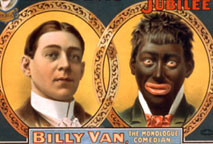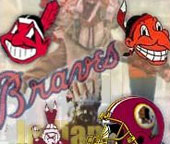
When a cartoon is not a cartoon
What is funny about a demonized prophet & terrorists?
Behrooz Ghamari
February 4, 2006
iranian.com
Last September Jyllands-Posten, a Danish conservative daily, published twelve cartoons of Prophet Muhammad. The cartoons were the paper’s response to a Danish author’s complaint that he could not find an artist who would be willing to draw illustrations for a book on the life of Prophet Mohammad. The paper ran twelve cartoons, in all of which the Prophet was depicted in derogatory ways. One cartoonist portrayed him as an apparent terrorist with a bomb-shaped turban, and in another he appears above the clouds warning the apparent martyrs that heaven had ran out of virgins.

Click on image to see larger
Three weeks ago, the cartoons were reprinted in Magazinet, a Christian evangelical newspaper in Norway, but later the newspaper decided to withdraw the cartoon from its website in the face of death threats. While the first run of the cartoons sparked some protest in Denmark, the reprints generated intense outrage in Muslim communities around Europe, and in the last few days, in many Muslim countries. Muslim groups in Europe and in the Middle East have called for a boycott of Danish products, and have demanded an apology from the offending newspapers. The protests that began as peaceful condemnation has now turned violent and has escalated into an international crisis.

Click on image to see larger
One of the cartoons, drawn by Lars Refn, prophesized the “seriousness of the Muslim threat to free speech.” Refn drew a student named Mohammad in front of a chalkboard on which is written in Farsi “Jyllands-Posten’s journalists are all reactionary provocateurs.” The paper has since apologized for offending Muslims, but maintains that “the 12 drawings were sober. They were not intended to be offensive, nor were they at variance with Danish law, but they have indisputably offended many Muslims for which we apologize.”

Click on image to see larger
But now Jyllands-Posten’s apology and the Danish government’s damage-control efforts are becoming irrelevant, as other European papers and governments, led by the French in their assiduous thirst for freedom, have come once again to the defense of freedom of speech. On Wednesday, February 1, France Soir published the twelve original cartoons and added an additional one in which Buddhist, Jewish, Christian holy figures console the Muslim Prophet, “Don’t worry Muhammad, we’ve all been caricatured here.”

Click on image to see larger
Publications in Germany, Spain, Italy, and the Netherlands have all reprinted these cartoons in support of free speech. One Dutch commentator observed, “we fought for freedom of religion and we need to defend it!”
While most pundits have tried to sell the case as a high-minded defense of free expression, I don’t buy it! At what point does an expression transgress the boundaries of decency and become hate-speech, and therefore not protected by laws or basic principles of freedom?
Denmark is home to more than 200,000 Muslim immigrants whose very presence in Danish society has fueled anti-immigrant sentiments. This of course is not a Danish problem. Rather than a sudden urge to defend the freedom of religion, the reprinting of the cartoons by many newspapers in different parts of Europe suggests that the Danes are not alone in their disdain of their Muslim minorities.
The Europeans share a skepticism that Muslims have no intention of assimilating into their societies and will exploit the generous European systems of social support without sharing the social values that come with it. In my opinion, the cartoons are not about Islam or the Prophet Muhammad. They are about Muslims whose presence disturbs European notions of the political, cultural, and aesthetic order.
Admittedly, a fine line separates hate-speech from free speech. This line becomes thinner when the speech is expressed in cartoons or other forms of visual art. Controversies arise when symbols and signs are used to humiliate a group of people who have been degraded and dehumanized in the past, or do not presently have the same means and powers to disseminate their own symbolic language. A cartoon ceases to be comic if the same groups of people who find that cartoon amusing have violated the dignity of its subject.
Western societies typically uphold the belief that expressions which incite violence and are generally regarded as demagogic, should not enjoy legal and political protection.
We have many examples of these ugly and degrading racial expressions in American society that ended only after decades of struggle and protest. I have no doubt that no one would think twice about suppressing reprints of Nazi anti-Semitic propaganda in American or European papers. Indeed, in June 2003, responding to pressures from several prominent Jewish groups, the Chicago Tribune issued an official apology for printing an offensive cartoon by Dick Locher. It depicted a hook-nosed figure of Ariel Sharon gazing at rows of dollar bills that President Bush is carefully laying down across a bridge called “MIDEAST GULCH.”

Click on image to see larger
The Sharon figure exclaims, “On second though, the pathway to peace is looking a bit brighter.” The confident Yasser Arafat awaits him on the other side. It is not hard to see the anti-Semitic insinuation of the cartoon, as it invokes a stereotypical portrayal of “the avaricious Jew” who would do any deed for money. Anything that resembles Nazi propaganda rightfully generates anxiety and anger among Jewish people. There is no satire in cartoons which remind us how historic degradation of European Jews justified their massacre.

Click on image to see larger
Ernst Hiemer, “The God of the Jews Is Money,” 1938.
See "Caricature or Bigotry?"
The Chicago Tribune had to apologize and it did. And no one accused Jewish groups who demanded an apology of intolerance. Nobody declared that Jewish groups did not respect the freedom of expression. Not a single newspaper in Europe or North America would reprint a Nazi cartoon with a caption that reads: “The God of the Jew is Money. And to gain money, he will commit the greatest crimes... ” They should not, because this is not a matter of free expression.
To give another example, when in 1993, the American actor Ted Danson appeared in black face at a Friars Club roast of the actress Whoppi Goldberg, there was an outcry in the black community about his insensitivity to the history of black oppression and how minstrel acts intended to dehumanize blacks. The Friars Club apologized and Danson suffered career setbacks for his poor judgment.

Click on image to see larger
Another example of demagogic expressions and demands for apology: Today there is an ongoing struggle over the usage of Native American mascots for American sports teams. The imagery and actions associated with these mascots reinforce stereotypes of indigenous peoples as “demonic,” “aggressive,” and “war-mongering.” They turn the image of a native warrior into a savage caricature.
Mascots turn people into mere historical objects without contemporary relevance. The supporters argue that mascots entertain audiences and should not become the subject of political debates and historical investigation. Fun is fun and by definition should not be taken seriously. For native peoples who were prohibited by Europeans from performing their own rituals in public, seeing whites dancing with colored faces and heads decorated with eagle feathers does not evoke humor or entertainment.

Click on image to see larger
As one Native American leader commented: “We experience [the use of Native mascots] as no less than a mockery of our cultures. We see objects sacred to us - such as eagle feathers, face painting and traditional dress - being used not in sacred ceremony, or in any cultural setting, but in another culture's game... Yes, we are proud of the warriors who fought to protect our cultures from forced removal and systematic genocide and to preserve our lands from the greed of others. We are proud, and we don't want them demeaned by being "honored" in a sports activity on a playing field.” (See: Barbara Munson)

Click on image to see larger
That was why in April 2003, the US Commission on Civil Rights called on school and professional sports teams to eliminate all derogatory symbols that trivialize Native American religions and cultures.
The case of the cartoons of the Prophet Muhammad is no exception to the public recognition of the difference between freedom of expression and hate-speech. What is considered to be demagogic and what is satirical, what is regarded as degrading and what is entertainment, what expressions ought to be prohibited and what is permissible are political questions with historically specific answers.
Those in Europe who think that they need to fight a battle for free speech and freedom of religion need to think harder and more reflexively about whose war they are fighting and who their enemies are. A bomb-turbaned Prophet turns all Muslims into terrorists. One must be free to satirize suicide bombers or terrorists of any persuasion. But lampooning Islam as inherently intolerant and Muslims as terrorist is neither wise nor commendable. In the American context, no one would call the spectacle of whites mocking blacks humorous.
Muslims who turn to violence in order to register their displeasure with the cartoons only turn themselves into the same caricatures against which they protest. Demanding an apology or boycotting consumer products are legitimate means of expression so long as they do not trade in words for bullets. Fists are the strongest when they are waved in the air, not when they land on the opponents face.
Instead of congratulating themselves for upholding the fine tradition of the freedom of speech, and savoring their prophesy of “Muslim Rage,” the French, British, Germans, Dutch, and Belgians shall recall Algeria, India, the Congo, and Indonesia. The Jyllands-Posten scandal is not about a cartoon, it is rather a reminder of a postcolonial world that has not yet come to terms with its own past. About
Behrooz Ghamari is a professor of history and sociology at the University of Illinois, Urbana-Champaign. He can be reached at bghamari@uiuc.edu He is the author of the forthcoming book Islam and Dissent in Postrevolutionary Iran.
|